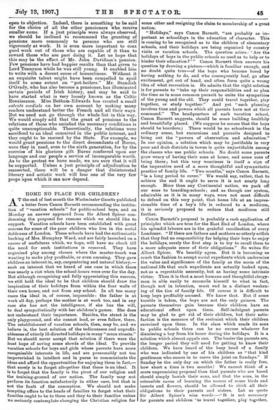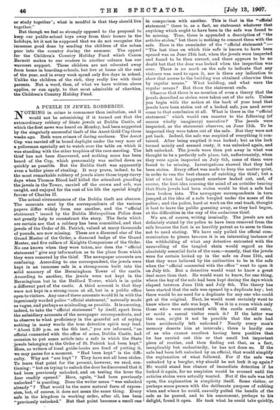HOME NO PLACE FOR CHILDREN?
AT the end of last month the Westminster Gazette published a letter from Canon Barnett recommending the institu- tion of " vacation schools " for public-school boys, and on Monday an answer appeared from Sir Albert Spicer con- demning the proposal for reasons which we should like to support. Vacation schools have been established with great success for some of the poor children who live in the social doldrums of London. These schools have had the enthusiastic backing of Mrs. Humphry Ward, and are fairly launched on a career of usefulness which, we hope, will have no check till the need for such institutions is removed. They have organised play among classes where the master-touch was wanting to make play profitable, or even amusing. They gave children an interest in, say, carpentering and natural history,— such an interest that we beard of one case in which there was nearly a riot when the school-hours were over for the day. But although recognising and fully appreciating this success, we still hold the ideal to be that children should draw the inspiration of their holidays from within the four walls of their own home, and not from any school. In all too many cases the ideal is, of course, impossible : the father is at work all day, perhaps the mother is at work too, and in any case she has not the intelligence, if she has the will, to deal sympathetically with her children's games. She does not understand their importance. Besides, the street is the only playground, and she cannot lead, or even follow, there. The establishment of vacation schools, then, may be, and we believe is, the best solution of the tediousness and unprofit- ableness of utterly ill-directed holidays in many "mean streets." But we should never accept that solution if there were the least hope of saving some shreds of the ideal. To provide vacation schools for boys and girls whose parents have some recognisable interests in life, and are presumably not too impoverished in intellect and in purse to communicate the ideas and afford the opportunities for enjoying them in fact,— that surely is to forget altogether that there is an ideal. It is to forget that the family is the pivot of our religion and the training-ground of our nation. The family may not perform its function satisfactorily in either case, but that is not the fault of .the conception. We should not make tempting offers to the heads of families to forget what their families ought to be to them and they to their families unless we seriously contemplate changing the Christian religion for some other and resigning the claim to membership of a great nation.
"Holidays," says Canon Barnett, "are probably as im- portant as schooldays in the education of character. This is coming to be recognised as to the children of elementary schools, and their holidays are being organised by country visits or vacation schools. The question arises : ' Are the holidays of boys in the public schools so used as to help or to hinder their education ? ' " Canon Barnett then answers his question by drawing a picture—which is familiar enough, and no doubt quite true—of the boys who become bored by having nothing to do, and who consequently loaf, go after excitement, get out of hand, and often form quite a wrong idea of what recreation is. He admits that the right solution is for parents to "take up their responsibilities and so plan the time as in some common pursuit to unite the sympathies of the young and the old. They could travel together, play together, or study together." And yet "such planning involves time and powers which all parents have not at their command." The headquarters of each vacation school, Canon Barnett suggests, should be some building healthily and beautifully placed. (We suppose he means that the boys should be boarders.) There would be no schoolwork in the ordinary sense, but excursions and pursuits designed to bring out the " powers of observation and admiration." In our opinion, a solution which may be justifiable in very poor and drab districts in towns is quite unjustifiable among the classes who use public schools. No doubt some parents grow weary of having their sons at home, and some sons of being there ; but this very weariness is itself a sign of the imperative need of a more thoughtful and sympathetic practice of family life. " Two months," says Canon Barnett, "is a long period to cover." We would say, rather, that to achieve the end it ought to serve it is not nearly long enough. More than any Continental nation, we pack off our sons to boarding-schools ; and as though our system, admirable as it is in many ways, were not most difficult to defend on this very point, that home life at an impres- sionable time of a boy's life is reduced to a modicum, it is seriously proposed to reduce that modicum still further.
Canon Barnett's proposal is probably a rash application of principles which are true for the East End of London, where his splendid labours are in the grateful recollection of every Londoner. "If there are fathers and mothers so utterly selfish that they feel no responsibility for helping their boys to enjoy the holidays, surely the first step is to try to recall them to a more adequate sense of their obligations." So writes Sir Albert Spicer. We heartily agree. But it is becoming so much the fashion to accept social expedients which undermine the value and significance of the family as the norm of the national life that such expedients are actually looked upon, not as a regrettable necessity, but as having some intrinsic virtue. Thus it is that a most humane and thoughtful clergy- man is able easily to reconcile himself to what in fact, though not' in intention, must end in a distinct weaken- ing of the ties of family life. Of course it is difficult to keep boys profitably amused. We know that. But if some trouble is taken, the boys are not the only gainers. The parents themselves gain because their children have an educational effect upon them. Self-indulgent parents may be glad to get rid of their children, but their satis- faction is the measure of the restraint which their children exercised upon them. In the class which sends its sons to public schools there can be no excuse whatever for dismissing a boy from his home during the holidays. It is a solution which almost appals one. The busier the parents are, the longer period they will need for getting to know their children. We have heard of the busy head of a family who was indicated by one of his children as " that kind gentleman who comes in to carve the joint on Sundays." If Sunday be the only day on which the father is really free, how short a time is two months ! We cannot think of a more unpromising proposal than that parents who are bored should simply banish their sons, and that the sons, in the ostensible cause of learning the names of some birds and insects and flowers, should be allowed to shirk all their obligations to their parents and sisters. Let us quote Sir Albert Spicer's wise words :—" It is not necessary for parents and children 'to travel together, play together, or study together'; what is needful is that they should live together."
But though we feel so strongly opposed to the proposal to keep our public-school boys away from their homes in the holidays, let it not be supposed that we do not recognise the immense good done by sending the children of the urban poor into the country during the summer. The appeal for the Children's Country Holiday Fund which Canon Barnett makes to our readers in another column has our warmest support. These children are not educated away from home in boarding-schools, but live at home all the rest of the year, and in every week spend only five days in school. Unlike the children of the rich, they really live with their parents. Not a word, then, of what we have written above applies, or can apply, to that most admirable of charities, the Children's Country Holiday Fund.







































 Previous page
Previous page